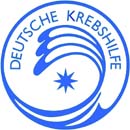a) Small molecular receptor tyrosine kinase inhibitors of VEGF, PDGF and bFGF signaling
b) TGFbeta signaling (small molecular TGFbeta RI and dual RI+II kinase inhibitors)
c) Integrin signaling (peptide and peptidomimetic antagonists of alpha V and beta 3/5 integrins)
d) Cyclooxygenase (COX-2) inhibitors
e) EGF signaling (antibody against EGFR with direct endothelial effects + indirect downregulation of VEGF, bFGF & IL8)
f) endogenous angiogenesis inhibitors (endostatin and angiostatin)
g) Toll like receptor agonists


Priority Research Program of the German Research
Foundation (Deutsche Forschungsgemeinschaft, DFG)
"SPP 1190: The Tumor-Vessel Interface"
In preparation for the new Heidelberger Ionenstrahl Therapiezentrum (HIT) facility the RBE of tumor and microenvironmental cells are determined in-vitro and in syngenic rat prostate cancer model in-vivo. In analogy to our work on systemic investigation of photon irradiation, the molecular and pathophysiological features of C12 therapy will be characterized.
b) Deciphering the molecular mechanism of tumor dormancy and angiogenic switch in animal tumor models established, i.e., dormant vs. fast growing human breast cancer, osteosarcoma, liposarcoma and glioblastoma models.

NASA Specialized Center of Research (NSCOR)
The NSCOR will provide a composite space radiation carcinogenesis model designed to reduce the uncertainties in risk estimates for astronauts.

Research Program of the German Krebshilfe
"Apoptosis deficiency and its modulation in malignant disease"
In collaboration with Sophie Domhan, Nephrology department, University of Heidelberg Medical School
a) the role of tumor microenvironment in development of pancreatic cancer in patients with chronic pancreatitis
b) molecular determinants of tumor differentiation (G1 vs. G3 tumors)
c) molecular determinants of tumor lymph node metastasis (N0 vs. N+ tumors)
d) effects of neodjuvant radiotherapy + gemcitabine (gemzar) vs. intensity modulated radiotherapy (IMRT) + gemzar vs. IMRT+ Cetuximab (PARC trial)
e) Investigation of primary tumors vs. lymphnode or liver metastasis
a) Patients with arteriovenous malformation after Stereotatic Radiosurgery
b) Patients with locally advanced pancreatic cancer (PARC) treated with trimodal cancer therapy consisting of radiotherapy, chemotherapy and EGFR-inhibition (Cetuximab)
c) Patients with acute kidney injury (AKI) post cardio-pulmonary bypass operation. In collaboration with Orfeas Liangos and Bertrand Jaber, Nephrology department, Caritas St. Elizabeth's medical center, Boston.